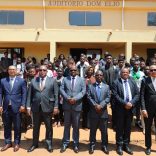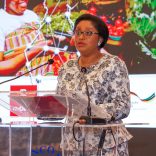AFDB approves $17 million to rebuild conflict-affected northern Mozambique
Mozambique: Women are being excluded from benefits of natural resources – Graça Machel

Photo: FDC - Fundação para o Desenvolvimento da Comunidade
- Mozambican women are also entitled to revenue from land, gas and other resources in Mozambique, says activist Graça Machel. PALOP women gathering in Maputo are also demanding greater political representation.
Women are being excluded from the benefits of natural resources, warns Graça Machel, former first lady of Mozambique and South Africa.
Production of liquefied natural gas (LNG) in the Rovuma basin is expected to start within months. Mozambique has one of the largest gas reserves in the world, and Graça Machel reminds us that everyone should benefit from natural resources and land, including women.
“Access to resources is a right, in the same way that women have the right to education and health. But I have heard very little from feminist movements about access to resources,” Graça Machel said while participating this Monday and Tuesday (19-20/04) in an umbrella meeting of feminist movements from Portuguese-speaking African countries in Maputo.

Machel asked organisations to unite and speak with one voice, the better to be heard.
“By meeting here and talking about women, we have to have a clear and deep awareness that we are talking about millions of women, not just the hundreds or thousands that we can identify through the organisations that are present here,” she said.
Greater political participation
The leaders of organisations defending women’s interests demanded greater political, economic and social participation for women.
Alice Banze, from the organisation Womens’ Academy For Africa (WAFA), regretted that many women still do not have access to decision-making processes.
“These dialogues aim to revitalise the movement and also defend gender equality and the empowerment of women and girls with the aim of advocating for greater representation of women in decision-making processes,” Banze said.
Women’s representation
In the new Mozambican Council of Ministers [cabinet] , for example, there are 11 men and 11 women. But for Liberation Front of Mozambique (Frelimo) deputy Telmina Pereira, “the challenges persist to raise the representation of women even more, until we also reach parity in parliament, that is, 50% women and 50% men”.
Parliamentary representation of women in Mozambique stands at 42.4%. Cape Verde follows little behind, with 38.9%, but in Angola, only 29.6% of deputies are women.
The meeting this Monday and Tuesday in Maputo brought together activists from all provinces of Mozambique and from Portuguese-speaking African countries Angola, Cape Verde, Guinea-Bissau, and São Tomé and Príncipe.













Leave a Reply
Be the First to Comment!
You must be logged in to post a comment.
You must be logged in to post a comment.